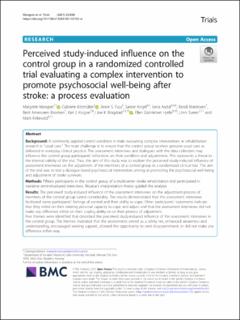| dc.contributor.author | Mangset, Margrete | |
| dc.contributor.author | Kitzmüller, Gabriele | |
| dc.contributor.author | Evju, Anne Svelstad | |
| dc.contributor.author | Angel, Sanne | |
| dc.contributor.author | Aadal, Lena | |
| dc.contributor.author | Martinsen, Randi Elisabeth | |
| dc.contributor.author | Bronken, Berit Arnesveen | |
| dc.contributor.author | kvigne, Kari | |
| dc.contributor.author | Bragstad, Line Kildal | |
| dc.contributor.author | Hjelle, Ellen Gabrielsen | |
| dc.contributor.author | Sveen, Unni | |
| dc.contributor.author | Kirkevold, Marit | |
| dc.date.accessioned | 2021-12-21T12:58:38Z | |
| dc.date.available | 2021-12-21T12:58:38Z | |
| dc.date.created | 2021-11-29T10:48:25Z | |
| dc.date.issued | 2021-11-27 | |
| dc.identifier.issn | 1745-6215 | |
| dc.identifier.uri | https://hdl.handle.net/11250/2835260 | |
| dc.description.abstract | Background: A commonly applied control condition in trials evaluating complex interventions in rehabilitation research is “usual care.” The main challenge is to ensure that the control group receives genuine usual care as delivered in everyday clinical practice. The assessment interviews and dialogues with the data collectors may influence the control group participants’ reflections on their condition and adjustments. This represents a threat to the internal validity of the trial. Thus, the aim of this study was to explore the perceived study-induced influence of assessment interviews on the adjustment of the members of a control group in a randomized clinical trial. The aim of the trial was to test a dialogue-based psychosocial intervention aiming at promoting the psychosocial well-being and adjustment of stroke survivors. Methods: Fifteen participants in the control group of a multicenter stroke rehabilitation trial participated in narrative semi-structured interviews. Ricoeur’s interpretation theory guided the analysis. Results: The perceived study-induced influence of the assessment interviews on the adjustment process of members of the control group varied considerably. The results demonstrated that the assessment interviews facilitated some participants’ feelings of control and their ability to cope. Other participants’ statements indicate that they relied on their existing personal capacity to cope and adjust and that the assessment interviews did not make any difference either on their coping ability or on their process of adjustment. Five themes were identified that described the perceived study-induced influence of the assessment interviews in the control group. The themes illustrated that the assessments served as a safety net, enhanced awareness and understanding, encouraged seeking support, allowed the opportunity to vent disappointment, or did not make any difference either way. Conclusions: RCT assessment interviews may influence the adjustment process and represent a serious problem in measuring interventions over time in trials of complex interventions in rehabilitation research. To uphold rigor and stringency, the usual care control conditions should be thoroughly assessed and described. Informing participants only about the treatment they were allocated to receive might counteract the potential to dilute the difference between the two arms of the trial. | en_US |
| dc.description.sponsorship | This study is part of a larger project that was supported by grants from the South-Eastern Norway Regional Health Authority and a grant from the Extra Foundation. The research leading to these results has received additional funding from the European Union Seventh Framework Program ((FP7-PEOPLE-2013-COFOUND) under grant agreement no. 609020_Scientia Fellows. The University of Oslo, Oslo University Hospital, the Inland Norway University of Applied Sciences, and the Arctic University of Norway. The funding is based on a protocol article (Kirkevold M, Bragstad KL, Bronken BA, Kvigne K, Martinsen R, Hjelle EG, et al. Promoting psychosocial well-being following stroke: Study protocol for a randomized, controlled trial. BMC Psy chol. 2018;6(1):12. and otherwise without any form of guidance regarding design and results. | en_US |
| dc.language.iso | eng | en_US |
| dc.publisher | BMC | en_US |
| dc.relation.ispartofseries | Trials;22, Article number: 850 (2021) | |
| dc.rights | Navngivelse 4.0 Internasjonal | * |
| dc.rights.uri | http://creativecommons.org/licenses/by/4.0/deed.no | * |
| dc.subject | Bias | en_US |
| dc.subject | Complex interventions | en_US |
| dc.subject | Control groups | en_US |
| dc.subject | Process evaluations | en_US |
| dc.subject | Research designs | en_US |
| dc.subject | Randomized controlled trials | en_US |
| dc.subject | Strokes | en_US |
| dc.title | Perceived study-induced influence on the control group in a randomized controlled trial evaluating a complex intervention to promote psychosocial well-being after stroke: a process evaluation | en_US |
| dc.type | Journal article | en_US |
| dc.type | Peer reviewed | en_US |
| dc.description.version | publishedVersion | en_US |
| dc.rights.holder | © The Author(s). 2021 | en_US |
| dc.source.articlenumber | 850 | en_US |
| cristin.ispublished | true | |
| cristin.fulltext | original | |
| cristin.qualitycode | 1 | |
| dc.identifier.doi | https://doi.org/10.1186/s13063-021-05765-w | |
| dc.identifier.cristin | 1960694 | |
| dc.source.journal | Trials | en_US |
| dc.source.volume | 22 | en_US |

